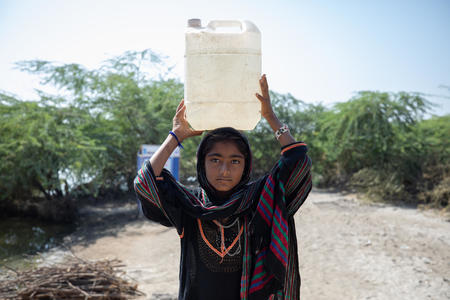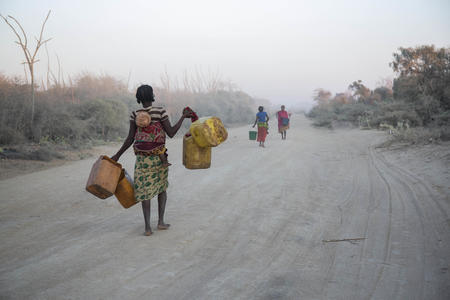Everyone, everywhere needs clean water. For many of us, it's normal to have it on tap. We use it every day in all sorts of ways and don’t think too much about it. But can you imagine life without it?
What's life like without clean water?
That's the reality for 703 million – almost 1 in 10 – people around the world.
Without a reliable source of clean water close to home, people have no choice but to collect dirty water for drinking, cooking and cleaning. This can spread deadly diseases like cholera.
It often means a long walk to the nearest stream or river, usually for women and girls, so there’s little time or energy left for paid work or school.
Whole communities are held back, simply because they don’t have clean water.
Why don't people just boil water, or move closer?
Boiling water doesn’t get rid of particles of dirt and burning a constant supply of fuel can be very difficult, expensive and bad for people’s health and the environment.
A community can't move every time a water source dries up – it's unlikely they will find a reliable source of clean water elsewhere.
Climate change is making things even worse: heavy rains cause flooding and pollute water sources, while increasingly frequent and severe droughts dry up already unreliable springs and wells.
Water means life
For the Munda people in Bangladesh, water is both a gift and a curse. When it's clean, it means life. But extreme weather is destroying water sources and making it increasingly hard to survive.
Read their story
How does WaterAid support people to get clean water?
Since 1981, we've supported 28.5 million people to get clean water. With taps they can rely on close to home, school and work, people can stay healthy. Girls can swap their daily walk for water for a walk to school. Women can give birth safely. And whole communities can thrive.
We know that clean water, along with decent toilets and good hygiene, really does save lives – but millions of people still face the dangers of drinking dirty water every day.
Water is a human right, and we're determined to make sure it’s a normal part of daily life for everyone, everywhere.
Find out how we’re using technology to provide reliable sources of water
We focus on long-term solutions
Watch our video The Water Chain to see what it takes to make a system work. We work with all the different links in the chain to make sure water, sanitation and hygiene services are delivered to everyone and sustained long into the future.
We’re determined to reach everyone, everywhere with sustainable clean water.
We can only achieve this by working in partnership, innovating and influencing for bigger and longer-lasting change.
What can I do?
Make a donation today and help to transform lives
Make a donation today and help to transform lives
Support our work to provide a reliable source of water to people like Mulu in Ethiopia.

Read our stories from around the world
Read our stories from around the world
As well as exciting projects we run to raise awareness and money to reach people with clean water.

Our impact
Our impact
Each year, we work with communities to create a world where everyone, everywhere has clean water.







